Empires and Barbarians: The Fall of Rome and the Birth of Europe QUOTES
SOME WORKS
- The Ghost Chronicles 2: (Book Two)
- The Egg and I (Betty MacDonald Memoirs, #1)
- Seraphim: Carpe Noctem
- Bunner Sisters
- Prairie Gold: An Anthology of the American Heartland
- Organic Manifesto: How Organic Farming Can Heal Our Planet, Feed the World, and Keep Us Safe
- Main Street Vegan: Everything You Need to Know to Eat Healthfully and Live Compassionately in the Real World
- Pirate (Alexander Hawke, #3)
- About Looking
- Allowed to Grow Old: Portraits of Elderly Animals from Farm Sanctuaries

